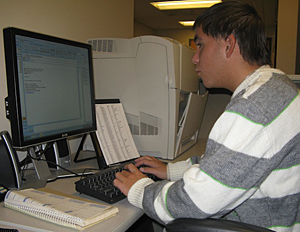


ADVERTISEMENT
- Rozovsky wins prestigious NSF Early Career Award
- UD students meet alumni, experience 'closing bell' at NYSE
- Newark Police seek assistance in identifying suspects in robbery
- Rivlin says bipartisan budget action, stronger budget rules key to reversing debt
- Stink bugs shouldn't pose problem until late summer
- Gao to honor Placido Domingo in Washington performance
- Adopt-A-Highway project keeps Lewes road clean
- WVUD's Radiothon fundraiser runs April 1-10
- W.D. Snodgrass Symposium to honor Pulitzer winner
- New guide helps cancer patients manage symptoms
- UD in the News, March 25, 2011
- For the Record, March 25, 2011
- Public opinion expert discusses world views of U.S. in Global Agenda series
- Congressional delegation, dean laud Center for Community Research and Service program
- Center for Political Communication sets symposium on politics, entertainment
- Students work to raise funds, awareness of domestic violence
- Equestrian team wins regional championship in Western riding
- Markell, Harker stress importance of agriculture to Delaware's economy
- Carol A. Ammon MBA Case Competition winners announced
- Prof presents blood-clotting studies at Gordon Research Conference
- Sexual Assault Awareness Month events, programs announced
- Stay connected with Sea Grant, CEOE e-newsletter
- A message to UD regarding the tragedy in Japan
- More News >>
- March 31-May 14: REP stages Neil Simon's 'The Good Doctor'
- April 2: Newark plans annual 'wine and dine'
- April 5: Expert perspective on U.S. health care
- April 5: Comedian Ace Guillen to visit Scrounge
- April 6, May 4: School of Nursing sponsors research lecture series
- April 6-May 4: Confucius Institute presents Chinese Film Series on Wednesdays
- April 6: IPCC's Pachauri to discuss sustainable development in DENIN Dialogue Series
- April 7: 'WVUDstock' radiothon concert announced
- April 8: English Language Institute presents 'Arts in Translation'
- April 9: Green and Healthy Living Expo planned at The Bob
- April 9: Center for Political Communication to host Onion editor
- April 10: Alumni Easter Egg-stravaganza planned
- April 11: CDS session to focus on visual assistive technologies
- April 12: T.J. Stiles to speak at UDLA annual dinner
- April 15, 16: Annual UD push lawnmower tune-up scheduled
- April 15, 16: Master Players series presents iMusic 4, China Magpie
- April 15, 16: Delaware Symphony, UD chorus to perform Mahler work
- April 18: Former NFL Coach Bill Cowher featured in UD Speaks
- April 21-24: Sesame Street Live brings Elmo and friends to The Bob
- April 30: Save the date for Ag Day 2011 at UD
- April 30: Symposium to consider 'Frontiers at the Chemistry-Biology Interface'
- April 30-May 1: Relay for Life set at Delaware Field House
- May 4: Delaware Membrane Protein Symposium announced
- May 5: Northwestern University's Leon Keer to deliver Kerr lecture
- May 7: Women's volleyball team to host second annual Spring Fling
- Through May 3: SPPA announces speakers for 10th annual lecture series
- Through May 4: Global Agenda sees U.S. through others' eyes; World Bank president to speak
- Through May 4: 'Research on Race, Ethnicity, Culture' topic of series
- Through May 9: Black American Studies announces lecture series
- Through May 11: 'Challenges in Jewish Culture' lecture series announced
- Through May 11: Area Studies research featured in speaker series
- Through June 5: 'Andy Warhol: Behind the Camera' on view in Old College Gallery
- Through July 15: 'Bodyscapes' on view at Mechanical Hall Gallery
- More What's Happening >>
- UD calendar >>
- Middle States evaluation team on campus April 5
- Phipps named HR Liaison of the Quarter
- Senior wins iPad for participating in assessment study
- April 19: Procurement Services schedules information sessions
- UD Bookstore announces spring break hours
- HealthyU Wellness Program encourages employees to 'Step into Spring'
- April 8-29: Faculty roundtable series considers student engagement
- GRE is changing; learn more at April 15 info session
- April 30: UD Evening with Blue Rocks set for employees
- Morris Library to be open 24/7 during final exams
- More Campus FYI >>
9:15 a.m., Nov. 11, 2010----The U.S. Department of Education has awarded the University of Delaware a $2.3 million grant to fund a five-year education project designed to expand postsecondary opportunities for young adults with intellectual disabilities (ID).
This model demonstration project will give students with intellectual disabilities the opportunity to enroll in a two-year Career and Life Studies Certificate (CLSC) program. The CLSC certificate is designed to provide a meaningful credential to students and help them move on to gainful employment.
The project is designed to positively impact a student's successful transition into adulthood and, at the same time, allow researchers to examine the factors that facilitate or impede those transitions.
It involves a large amount of University-wide and eventually, statewide collaboration. Within the College of Education and Human Development (CEHD), Laura Eisenman, associate professor in the School of Education, is overseeing the project. Beth Mineo, center director for the Center for Disabilities Studies (CDS) and associate professor in the Department of Human Development and Family Studies (HDFS), will serve as the faculty adviser.
The program involves additional staff from CDS and is also coordinating with the Division of Professional and Continuing Studies at the University.
"We view it as a natural extension of the work that's been done here on campus, in partnership with school districts and community agencies," said Eisenman. "What the model program allows us to do is create a more comprehensive program and plug in the additional supports that will make for a meaningful experience."
For more than 15 years, UD has collaborated with school districts in the state to provide campus- and community-based education services to young adults who have intellectual and developmental disabilities. Additionally, working with transition programs and employment services, like the Swank Employment project, has helped the University lay the framework needed to establish a model demonstration program for postsecondary education.
The two-year program will offer a specialized career studies track and life studies track, as well as other inclusive learning opportunities for students on campus. Each student will have an individualized plan that includes peer mentoring and staff coaching. The students' academic year will begin in the summer with an orientation and other sessions, which will allow them to become acclimated to campus life.
"This program is going to be a game-changer," said Mineo. "One of the key tenets is integration, so we are going to be working hard to ensure that the students have a full, meaningful campus experience, both academically and socially."
Program organizers hope to admit 15 students into the first cohort for fall 2011. Details about eligibility and the admissions process will be available by February.
While there have been specific postsecondary opportunities for students with ID in terms of academic tutoring or employment training, the state has never been able to offer such a comprehensive, integrated program at the postsecondary level specifically for people with intellectual disabilities.
"Professional and Continuing Studies is honored to work with CEHD in offering this innovative and important certificate program," said James Broomall, assistant provost, Division of Professional and Continuing Studies. "Our units partners with each of the seven academic colleges to meet the learning and career goals of adult and nontraditional students. The U.S. Department of Education funded program for students with disabilities is a special opportunity to meet their needs. We look forward to providing the administrative, marketing, and program support for this unique certificate program."
Although the grant is designed to fund the program for five years, it will also establish partnerships between UD, Delaware State University, and other institutions of higher education in an effort to promote the sustainability and replication of the program.
"College wasn't an option before for students with ID at the post-secondary education level," said Eisenman. "The idea is to mirror the options available to other people in our community without disabilities. This is one that we are very excited about being able to offer."
In October, the U.S. Department of Education awarded more than $10.5 million to 27 two- and four- year institutions of higher education or consortia of institutions as part of the Transition Programs for Students with Intellectual Disabilities (TPSID) and established a national coordinating center.
Article by Cassandra Kramer


